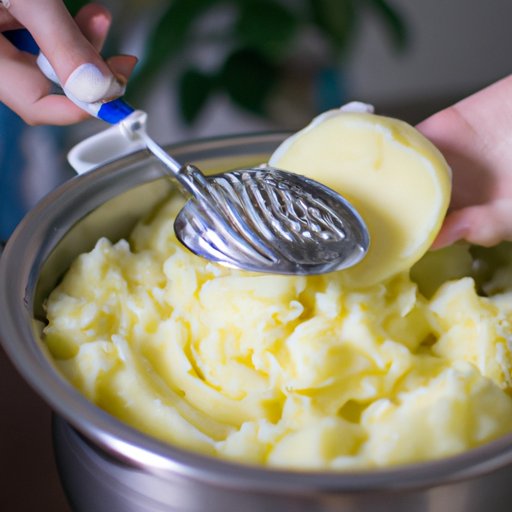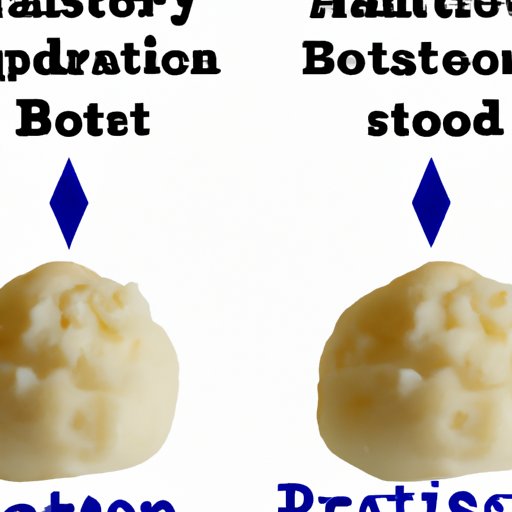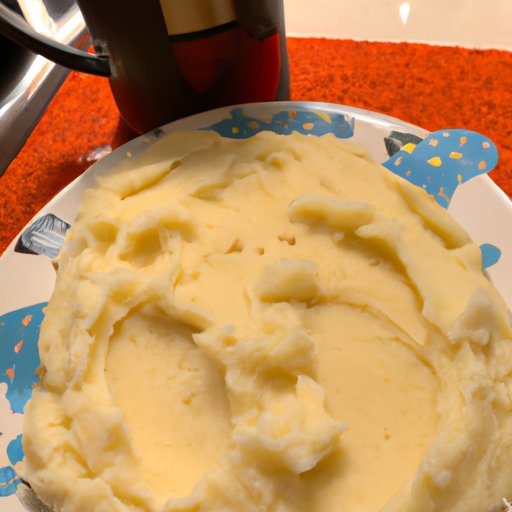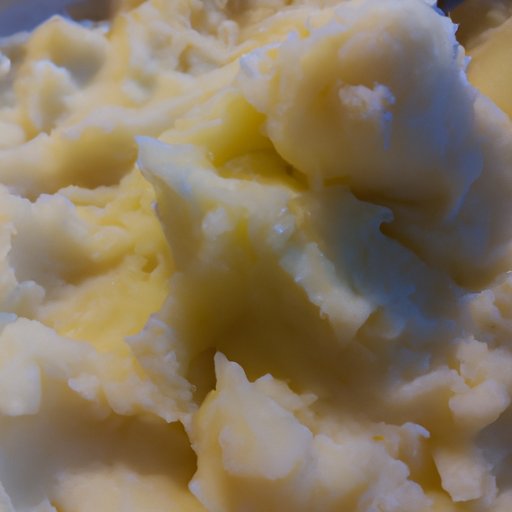Introduction
Mashed potatoes are a beloved staple in many people’s diets. They can be enjoyed as part of a meal or even as a snack on their own. But is this comfort food actually healthy? In this article, we will explore the nutritional benefits of mashed potatoes and provide tips on how to make them healthier.
Examining the Nutritional Benefits of Mashed Potatoes
Mashed potatoes are made from boiled potatoes, which are a nutrient-dense food. Potatoes are an excellent source of vitamins and minerals, including vitamin C, magnesium, phosphorus, and potassium. They also contain fiber, which is essential for digestive health. Additionally, potatoes are a low-fat food and are free of cholesterol.
Eating mashed potatoes can offer some health benefits. According to a study published in the American Journal of Clinical Nutrition, eating potatoes may reduce the risk of cardiovascular disease and type 2 diabetes. Another study found that potatoes can help to regulate blood sugar levels, which can be beneficial for people with diabetes. Additionally, potatoes contain resistant starch, which can help to promote gut health.

How to Make Healthy Mashed Potatoes at Home
Making your own mashed potatoes at home is a great way to ensure that you’re eating a healthy version of this dish. To make mashed potatoes, you’ll need potatoes, butter, milk, and salt. You can also add other ingredients, such as garlic, herbs, or cheese, to give the mashed potatoes more flavor.
To make mashed potatoes, start by peeling and cutting the potatoes into cubes. Put the potatoes in a pot and cover them with cold water. Bring the water to a boil and then reduce the heat and simmer until the potatoes are tender. Drain the potatoes and return them to the pot. Mash the potatoes with a potato masher or fork until they reach your desired consistency. Add butter, milk, and salt to taste. Stir until everything is combined and serve.
Pros and Cons of Eating Mashed Potatoes
Like any food, there are both advantages and disadvantages to eating mashed potatoes. On the plus side, mashed potatoes are a delicious and comforting food that can easily be incorporated into meals. They also provide a good source of energy and nutrients, making them a nutritious choice.
On the downside, mashed potatoes are high in calories and carbohydrates. They’re also often served with butter and cream, which adds fat and calories to the dish. Additionally, store-bought instant mashed potatoes often contain added ingredients, such as preservatives and artificial flavors, which can be unhealthy.

Comparing the Health Benefits of Mashed Potatoes to Other Carbohydrates
It’s important to understand how mashed potatoes compare to other sources of carbohydrates. Common sources of carbohydrates include grains, fruits, and legumes. All of these foods provide energy and nutrients, but they vary in terms of their nutrient content. For example, whole grains are higher in fiber than processed grains, while legumes are higher in protein than other types of carbohydrates.
When comparing mashed potatoes to other sources of carbohydrates, it’s important to consider their nutrient content. Potatoes are lower in fiber and protein than other carbohydrates, but they’re higher in vitamins and minerals. Additionally, potatoes are naturally low in fat and free of cholesterol, making them a healthier choice than some other sources of carbohydrates.
What to Look for in Store-Bought Mashed Potatoes
If you’re looking for convenience, store-bought mashed potatoes can be a good option. However, it’s important to look for ones that are made with healthy ingredients. Avoid products that contain added sugars, fats, or preservatives. Instead, look for mashed potatoes that are made with real potatoes and natural ingredients, such as butter and cream.
It’s also important to read the nutrition label to ensure that the product is low in calories and saturated fat. Additionally, check the ingredient list to make sure that the product doesn’t contain artificial flavors or colors.

Exploring Creative Ways to Add Nutrition to Mashed Potatoes
You can also add nutrition to mashed potatoes by incorporating other ingredients. Adding vegetables, such as carrots or cauliflower, is a great way to increase the nutrient content of the dish. You can also add beans or lentils to make the mashed potatoes more filling and nutritious.
Another way to make mashed potatoes healthier is to add protein. This can be done by stirring in cooked chicken, turkey, or tofu. You can also add nuts or seeds for extra crunch and nutrition.
Conclusion
Mashed potatoes can be a nutritious and delicious part of your diet. They are an excellent source of vitamins and minerals and can offer health benefits, such as helping to regulate blood sugar levels. When making mashed potatoes at home, opt for healthy ingredients, such as butter and fresh vegetables. If you choose to buy store-bought mashed potatoes, look for products that are made with real potatoes and natural ingredients. Additionally, you can add nutrition to mashed potatoes by incorporating other ingredients, such as vegetables, beans, and protein.
In conclusion, mashed potatoes can be a healthy and satisfying addition to your diet. Just remember to opt for healthy ingredients and watch your portion sizes. With a few simple modifications, you can enjoy this comfort food without compromising your health.
(Note: Is this article not meeting your expectations? Do you have knowledge or insights to share? Unlock new opportunities and expand your reach by joining our authors team. Click Registration to join us and share your expertise with our readers.)
